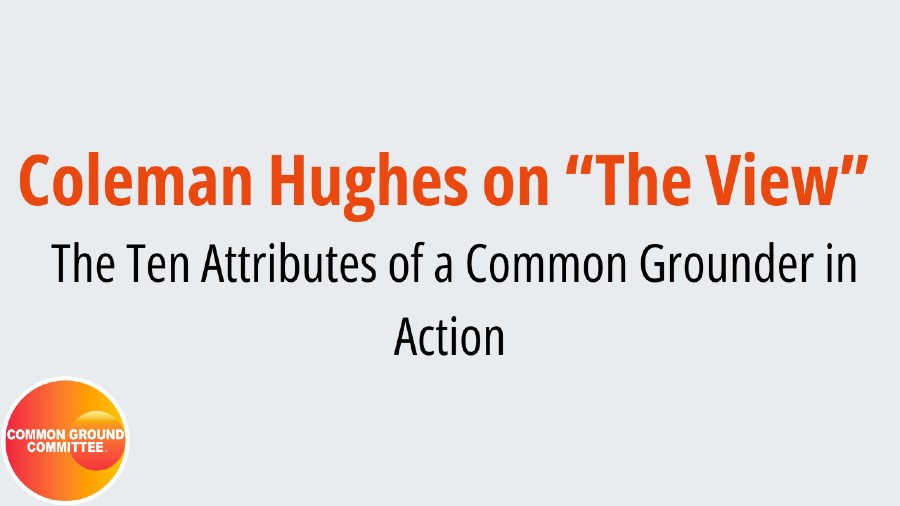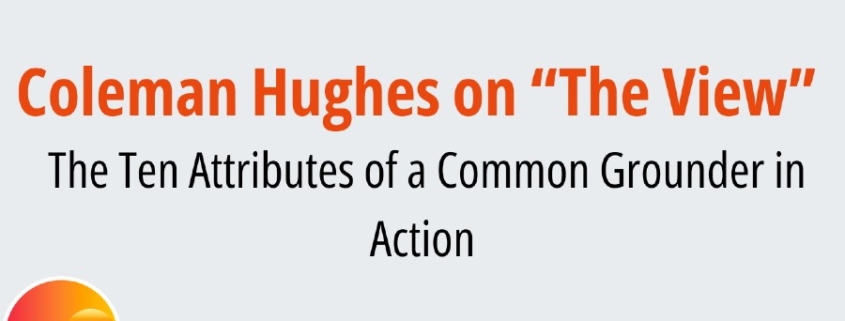Civil Discourse in Action: Coleman Hughes on “The View”

In a compelling segment on “The View,” Coleman Hughes, the author of “The End of Race Politics: Arguments for a Colorblind America,” demonstrated the 10 Attributes of a Common Grounder, particularly in the face of challenging discourse. His approach to discussing societal ideals and policy nuances reflected a commitment to civil and constructive conversation, even under pressure.
Hughes’s perspective diverges from mainstream narratives and offers a fresh approach to race in America. His viewpoint aligns with the values echoed by early civil rights leaders who aspired to a world where freedom and justice are not distributed based on racial identity. In his discourse, Hughes posited, “Color blindness isn’t pretending not to see race; it is that we should try our very best to treat people without regard to race, both in our personal lives and our public policy.” This foundational statement not only sets the tone for a conversation aimed at understanding and progress but also offers a new lens through which to view race in America.
Despite facing challenges to his perspective on “The View,” Coleman Hughes remained composed and resilient, skillfully steering the conversation towards a productive exchange. His calm response to an ad hominem attack exemplified key Common Grounder traits—de-escalating tension, maintaining respect, and focusing on facts over winning the debate. His ability to stay focused and composed in the face of adversity is inspiring.
In a segment that nearly escalated into a heated debate, host Sunny Hostin targeted Hughes’s character while challenging his views on Martin Luther King Jr.’s concept of a “Bill of Rights for the Disadvantaged.” Hughes countered by explaining that we should indeed address racial inequality and the legacy of slavery but through class-based measures. Hostin cited a quote from King’s “Where Do We Go from Here,” arguing that King’s emphasis on race was explicit and vital.
Before Hughes could fully address her initial statement, Hostin suggested that many in the Black community view Hughes as a pawn used by conservative groups, calling him a charlatan. Rather than retaliate, Hughes redirected the conversation to the original topic, clarifying that the “special” actions referenced in King’s book aligned with King’s advocacy for a “Bill of Rights for the Disadvantaged.” Despite Hostin’s continued challenge in the context of King’s quote, Hughes adroitly managed to steer the discussion away from personal attacks, asserting his independence and previous voting record to counter the ad hominem tactics employed. His commitment to the 9th and 10th Attributes of a Common Grounder—Resisting Demonizing and De-escalating Hostile Situations—was evident as he navigated the conversation toward a more constructive and less personal direction.
While it is unrealistic to expect to find common ground in every discussion, the importance of maintaining civility cannot be overstated. Hughes’s demeanor and strategic responses during the debate upheld the principles of civility. He exemplified the 10 Attributes of a Common Grounder, mainly focusing on Resisting Demonizing and De-escalating Hostile Situations. His approach underscores the importance of focusing on constructive dialogue and mutual respect. For those looking to engage in similarly productive conversations, embracing these attributes can provide a framework for fostering understanding and respect. Consider downloading the complete list of the 10 Attributes to guide your discussions and enhance your communicative effectiveness. Remember, even in the most challenging discussions, maintaining civility can lead to productive outcomes.





